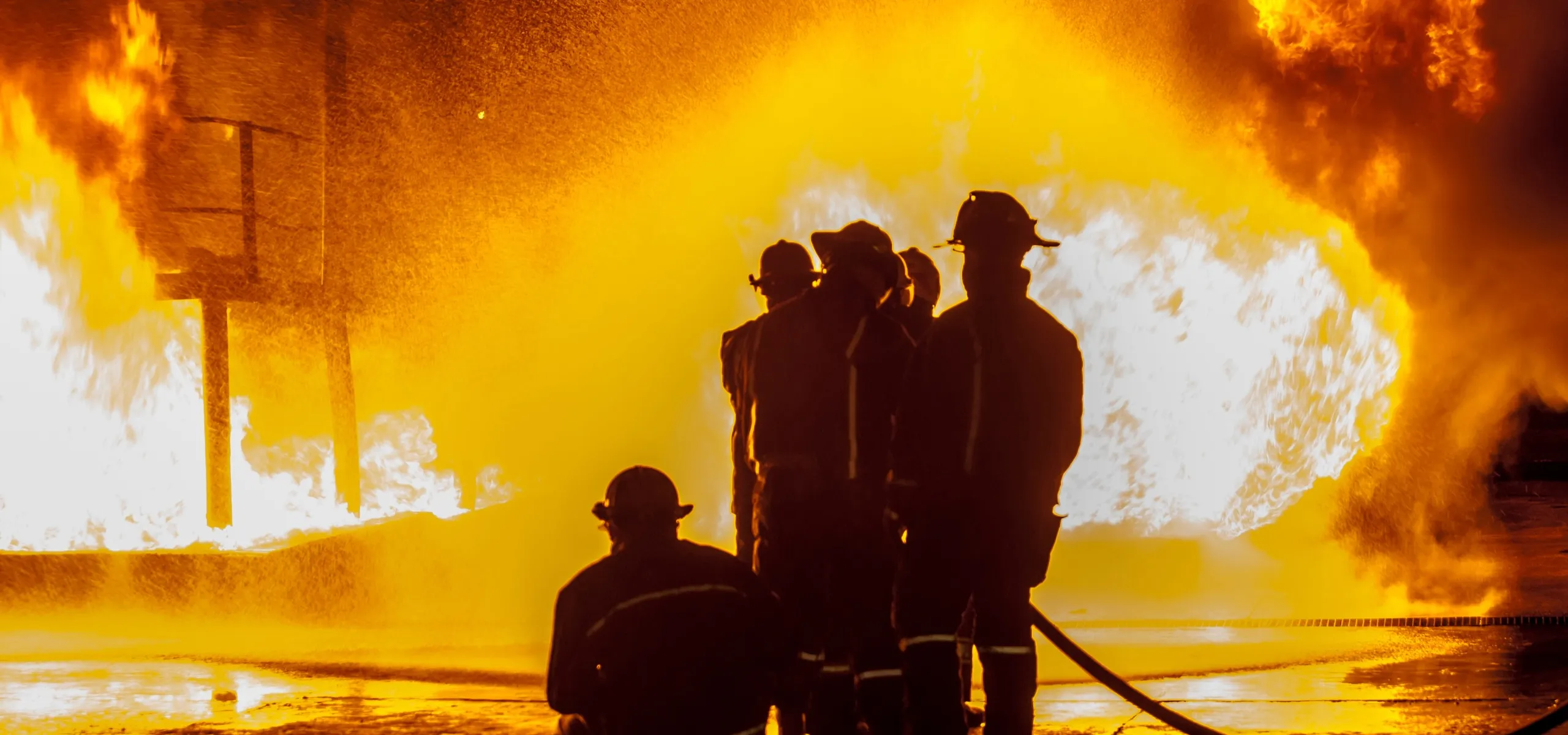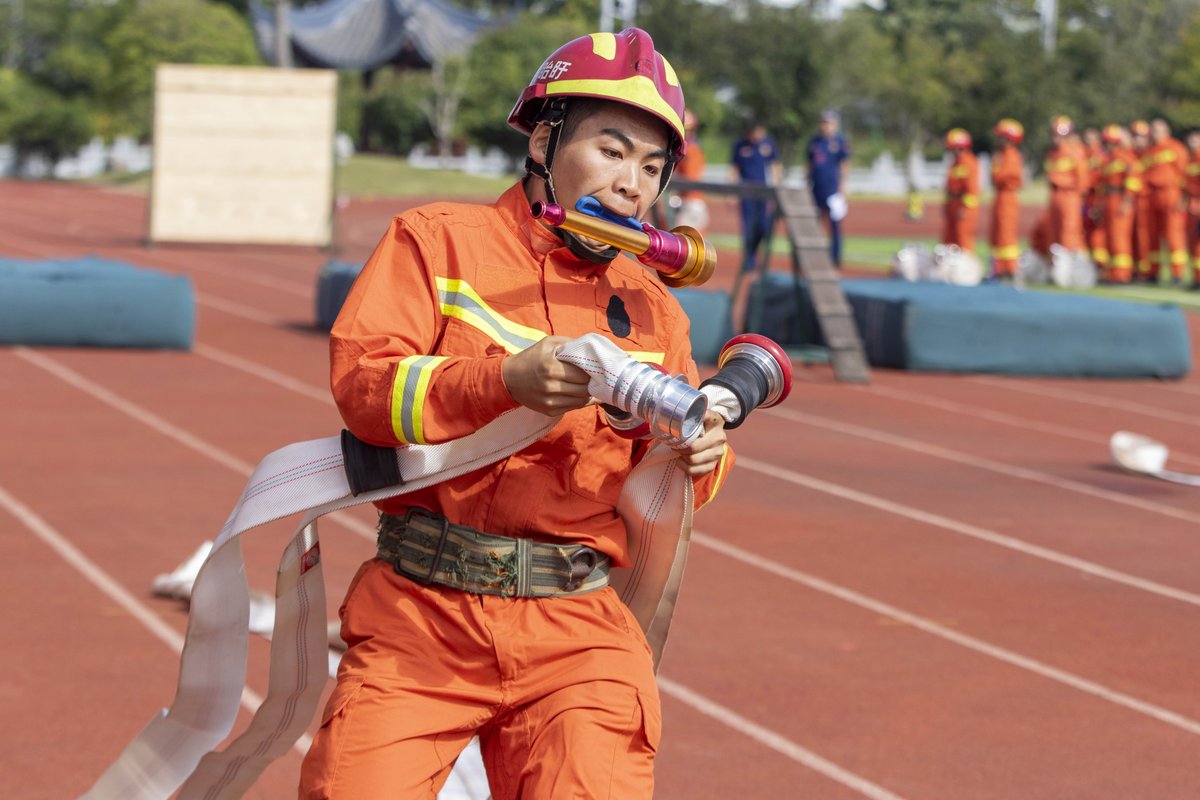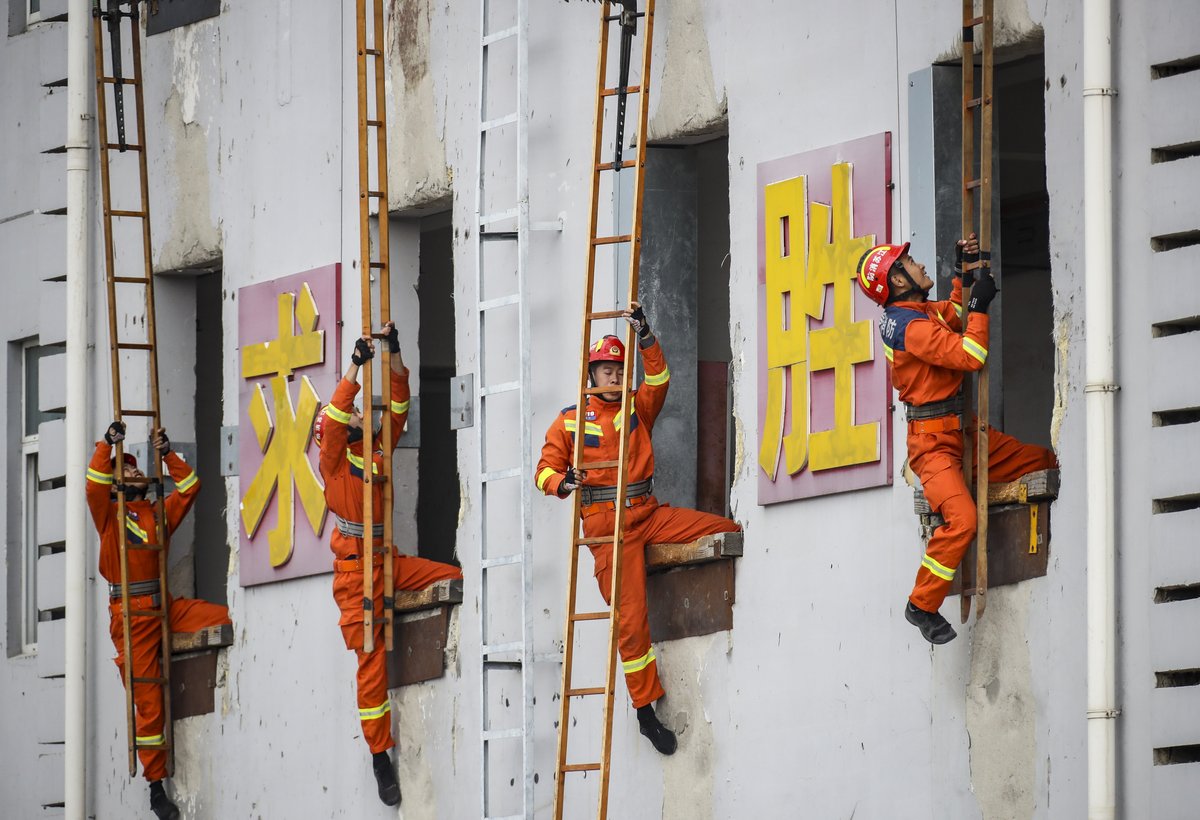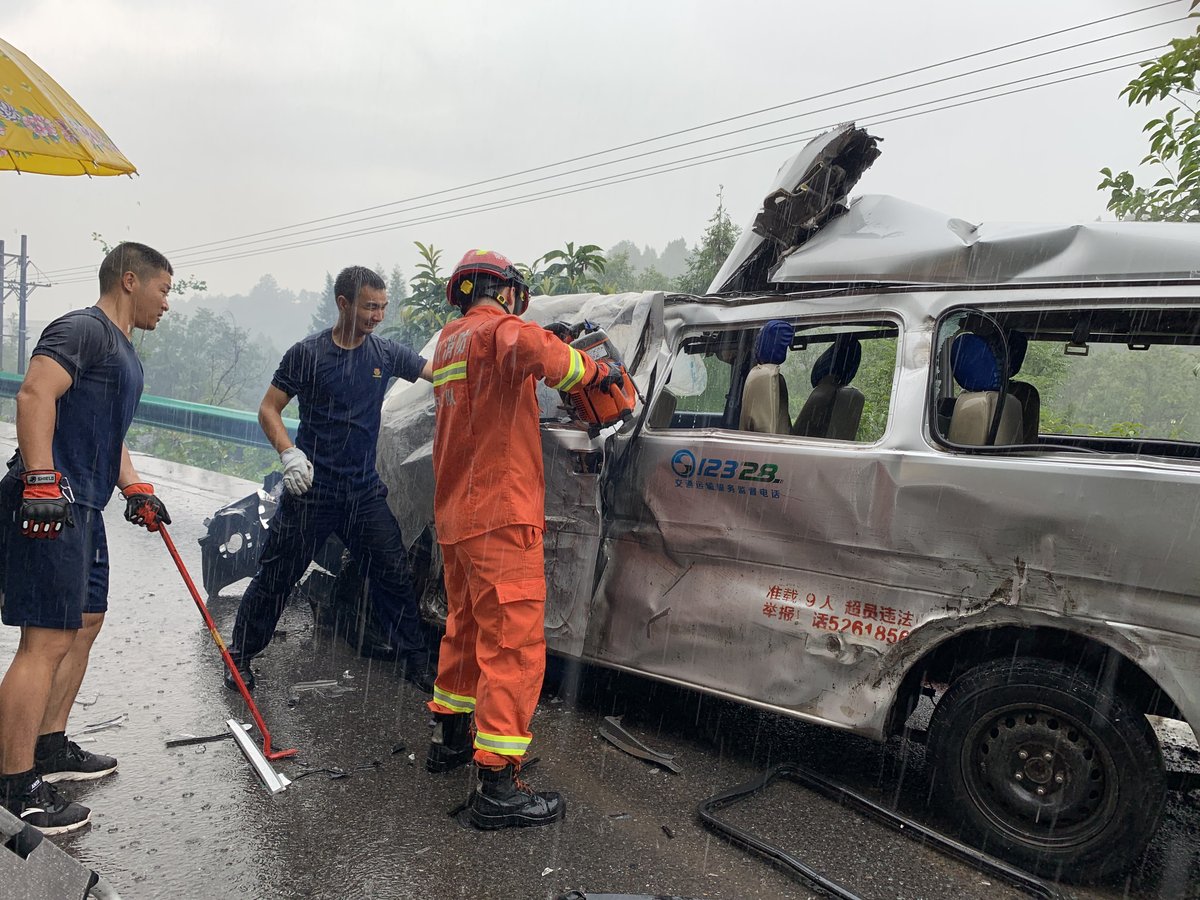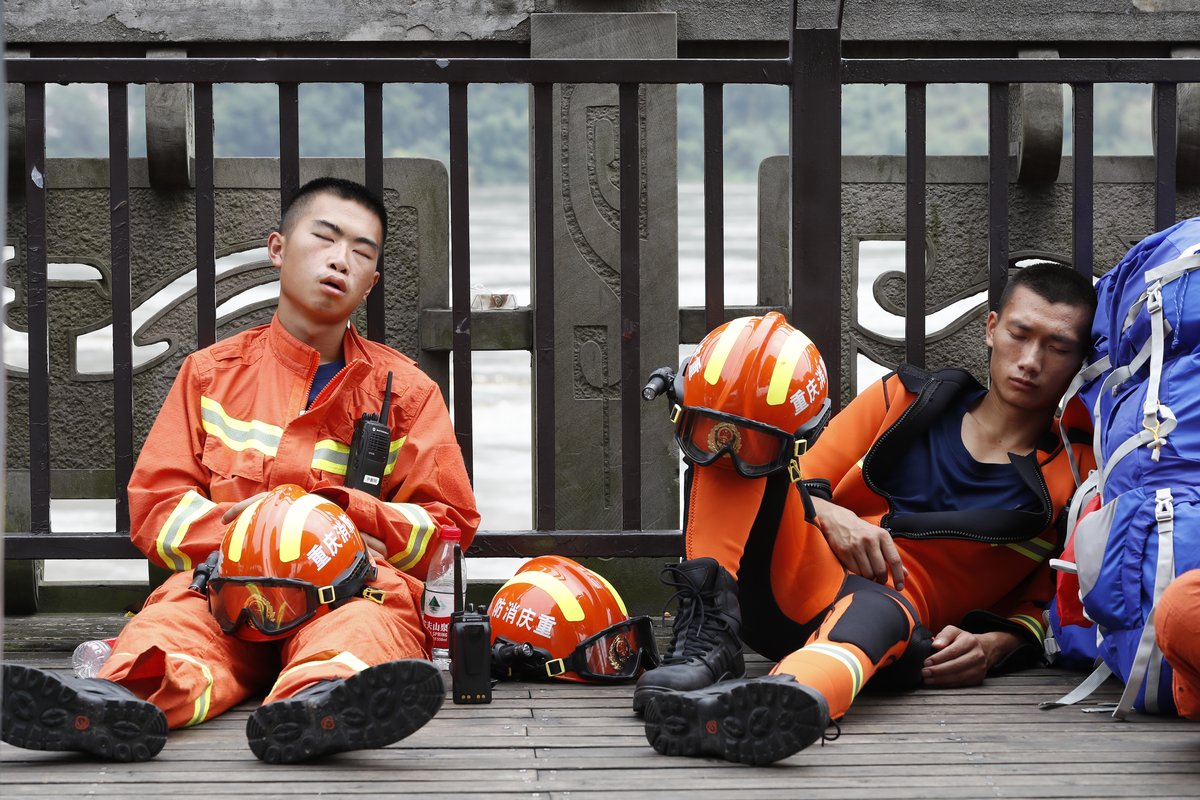A former firefigher reflects on human emotions and fragility of life in the course of his dangerous career
It has been a rough few months in terms of natural disasters since last August. With each new calamity, whether wildfires in Chongqing or the earthquake that struck Luding county in Sichuan, we have seen images of firefighters running to battle on the front lines.
Today, we hear from Chenchen, a young man who worked as a firefighter for eight years. With each deployment to an emergency, Chenchen experiences countless life-and-death moments, and has witnessed the full gamut of human feelings. In addition, Chenchen worked as a dispatcher answering emergency calls at the fire brigade’s command center, the starting point of all firefighting missions.
-1-
A Rebellious Teen Joins Up
My name is Chenchen and I am 28 years old.
I was only 18 and feeling pretty rebellious when I suddenly decided to join the army as a soldier, right after my college entrance examination. When I found out that my family had changed my university enrollment form without my knowledge, signing me up for a different school to the one I’d originally wanted to attend, I thought I’d pay them back. I thought: Since I didn’t get a say in where I go to school, I’ll join the army without asking you either.
At the time of my enlistment, the national fire brigade still belonged to the military. More specifically, it was one of the eight subdivisions managed by the People’s Armed Police (PAP) —firefighting, border defense, internal guard, economic construction units, hydropower command, communications command, gold-mining, and forestry. When I learned that I was about to be assigned to the fire brigade, I felt excited, anxious, and scared all at once.
After enlisting in the army, I completed three months of foundational training, followed by another month in the fire brigade. This stage of training is relatively basic. New recruits are expected to carry out physical training and learn to use the equipment, such as special suits and air respirators. We also take part in fire and smoke simulations where we are placed in a room full of black smoke and asked to find some item—a dummy, a ball, or a sound generator.
Firefighting is an empirical science. That means that no matter how much we learn during our training, it will mean nothing unless it’s followed by actual, real-life experience.
Once I was done with my training, I was assigned to a fire squadron and began joining specific firefighting missions. My first fire alarm happened on my third or fourth day with the team. It went off in the middle of the night, when everyone was still sleeping. However, as soon as the bell rang, we all woke up and sprang into action. This was crucial, because the fire brigade was required to respond to an alarm within 45 seconds.
I still remember how excited I was that first time. I was not scared at all.
Story FM: The fire brigade’s command center gets to process every emergency alert first. They are like the brains of our firefighting system. All 119 calls are diverted to them, and depending on the situation, they have to decide the protocol to apply, fast.
Answering these phone calls isn’t a simple task. Quite the opposite. The dispatcher has to have a firm grasp of fire prevention and control guidelines at all times. They have to make the right call every single time, and there is no time to lose.
-2-
Responding in 45 Seconds
As a dispatcher, you will find yourself assessing many different situations. For example, sometimes you’ll get a call from someone who isn’t familiar with their surroundings, so they can only give you a general description of their location. Whenever that happened, I had to base myself off of clues to find out their whereabouts as quickly as possible. Then, I had to send the nearest fire brigade to the emergency site. I had to dispatch this call to the fire brigade within 45 seconds, and no longer than a minute.
Even after I’d dispatched the emergency, sometimes I had to stay on the phone. Take someone threatening to commit suicide, for instance—I had to stay on the line to try and dissuade them by just about every way I could think of. Or, if it was a traffic accident involving a crash, I had to ask if there were injuries or deaths. If the caller was injured, I had to tell them how to take care of themselves.
Different emergencies also mean that we needed to cooperate with different units. Let’s talk traffic accidents again—I had to notify the traffic police so that they would turn up to secure the scene of the accident. If there were any casualties, I had to call 120. All of these tasks were to be carried out immediately. I had to respond quickly and always in coordination with these other offices.
With major crises such as natural disasters, you’re going to get tons of calls at the same time. When that happened, we still had to answer as many calls as possible, all at once. Not every person calling will keep their cool and report the situation properly. We also get our fair share of false alarms and even harassment. So, a crucial part of our work is learning to tell apart real emergencies from hoaxes, and figure out the right response for each situation.
-3-
The Arsonist’s Child
In the worst case scenario, you fail to make the right call to a serious emergency because the caller fails to give an accurate description of the situation. When the fire brigade arrives at the scene and has to call in reinforcements because you misjudged the situation, the rescue operation will likely be delayed, and you will be held accountable. I can’t stress it enough—it’s all down to you at that initial stage, and you have to be quick, decisive, and accurate from the start.
Once, I received an emergency call from a child. He couldn’t have been older than 8 or 9 years old. With children, they tend to yell when they call the emergency services, but this kid was very calm. I couldn’t help but think that maybe he was trying to pull a prank on me.
“Hi? Hello. My house is on fire.”
“Is your family there? Can they get on the phone?”
“My mom is here, but she can’t answer the phone. She’s crazy. And, she’s locked in her room, and I’m locked in mine.”
I thought this was all really strange, but I kept interrogating the kid.
“I see. So, can you smell or see the fire right now?”
“I can already smell the fire in our kitchen. And I can see the fire through the crack of the door.”
When he said this, I thought, maybe his house is really on fire. So I immediately asked the kid for his address and sent a fire brigade to check what was going on.
By the time they got there, the fire had already caused quite some damage. The fire brigade found both the child and his mom locked in their rooms. Later in the investigation, it was revealed that the mother was mentally ill, just like the child had reported. However, the arsonist was the father. He’d set the house on fire after locking up his family, planning to burn them to death.
I don’t know the rest of that story, but to this day I still admire that kid. I’ve picked up many emergency calls, and this much I can tell you—many grown-ups wouldn’t have handled it as well as he did.
Story FM: Once the command centre has received an alarm and dispatched a fire brigade to the emergency scene, the focus shifts to wherever the action is taking place. People will naturally walk away from danger—except for firefighters. In his race against time to complete a rescue operation, Chenchen has experienced his fair share of crises.
-4-
Running into Fire
What does the scene of a fire feel like for a firefighter?
If a particularly large fire is raging in a relatively enclosed space, the smoke inside will be so dark, so thick and dense, that you won’t be able to see your hand even if you waved it in front of your face with your flashlight on. That heavy smoke just keeps pouring in, and all you can hear is your own breathing and whatever comes out from your walkie-talkie. At this point of your mission, you must find the origin of the fire. And in order to do that, you must feel your way forward very slowly.
It’s an oppressive scene, and it’s honestly a little scary too.
On another occasion, I was sent to check a warehouse on fire. With piles of toilet paper and medicines stocked there, the flames grew big and tall. The temperatures were so high, the whole warehouse, made of steel sheets, collapsed.
By the time I got there, the fire was almost out, but I still needed to go in and snap some photos and videos. A sheet of iron fell from behind me and hit my helmet, sending me to the ground face-first. Not only had I scratched my scalp really bad and dislocated my arm; on my fall, I managed to smash the air respirator mask I was wearing, and a fragment the size of two or three fingernails got lodged right between my eyebrows.
I actually didn’t realize that I was injured right away. I just ran out of the warehouse to get new equipment and rush back in again. I really didn’t notice until someone else told me.
The incident scared me for a while, but you’re bound to get injuries as a firefighter. When you’re in the army long enough as I was, getting injured head-to-toe is a rite of passage. And, as I got more and more experienced, I also started paying more and more attention to my surroundings.
A lot of cases come to my mind now. For example, if you’re going to deal with a gas tank, you need to know the right moment for handling it. You often see firefighters coming out of an emergency scene carrying gas canisters that are still on fire. That’s because at that stage they are easier—safer, really—to handle. When one of those canisters stops spewing fire and just makes this piercing whistle like a kettle, it means that it could explode at any time, and so it’s unsafe to tamper with.
As a frontline firefighter, you get most of the knowledge and skills you need through actual experience in the field.
Most of us were barely out of our teens when we became firefighters. At least, that’s the case here in China. Whenever we put on our suits, it’s hard to tell how old we are. Sometimes, the people will even address us respectfully as “uncle,” but underneath our clothing we’re actually younger than the person we rescued. This means many of us are lacking experience.
In countries like the US, a firefighter in his mid-40s could be still be serving on active duty. They’re likely the leader of their squadron. But in China, it’s quite rare to see a 45-year-old guy on the front lines. Yet firefighting is all about experience, and it takes seasoned folks to be able to do it well.
China’s recent reforms seem to go down that line of thought. In 2018, the Ministry of Emergency Management took over the functions of the former paramilitary Firefighting Corps of the PAP, nowadays known as China Fire and Rescue. The goal here was to create a more professional fire brigade.
But no matter how much we sharpen our skills and gain experience, challenges are constant for frontline firefighters, and death is always just around the corner.
-5-
My First Brush with Death
The first time I saw casualties on my shift, it was at the scene of a car accident on a provincial highway.
There are a lot of freight trucks on the road, and an SUV rear-ended one of them with such force, both the driver’s seat and the passenger seat ended up wedged under the truck. There was a family of four in the car—the father was the driver, the mother was in the passenger seat, and the son and daughter were in the back. Only the little girl survived the crash, likely because she was tiny; she looked like a first-grader, and so she got stuck in the gap under the car.
At the scene, we had to use professional rescue tools like the “octopus” to extricate the victims out of the totaled vehicle and get the little girl out safely. When we finally got a hold of her, she was shaking all over and crying silently. Her parents’ bodies were badly disfigured in the collision. She had to be really traumatized after witnessing that.
When the paramedics tried to pull her away, she didn’t want to leave. She just cried and cried for her mom and dad.
When you go through training as a new recruit, the veterans give you the whole run of potential situations you’ll encounter on the job, and they also try to mentally prepare you for what you’re bound to see. But none of that really took the sadness away when I actually saw the bodies with my own eyes.
Usually, after we put out a fire, we play music in the truck on the way back to the station. Everyone’s relaxed, and it feels a bit like going back home.
But that day, nobody said a word on the way back. It all just felt so very heavy.
-6-
The Fragility of Life
We had this shantytown in our area that’s scheduled for demolition. Most people had moved out, but there was this old guy who just refused to leave. He was a widower and picked up trash that he sold for a living. He also had a physically disabled daughter at home.
The old guy’s daily haul was all stored in a pile in his house, and most of it was flammable. One day, his house caught fire while the daughter was still inside, but the man didn’t know how to call the fire department. It wasn’t until the fire got so big that a police unit patrolling nearby saw it that they finally called us
After we got there, we extinguished the fire and went in to try and save anyone who was inside, but it was too late. The old guy’s daughter was already dead. All we could do was carry her charred remains out of that house. The smell of charred flesh and the state of her body made my hands shake with fear.
The old guy followed us as we carried the stretcher out, and I could see the despair in his eyes.
In the midst of it all, there’s this scene that really stuck with me. Having rushed to the scene himself, the old man pulled over a small hose from the house next to him to combat the huge fire. It was completely out of control by then, so his efforts were in vain—it was, quite literally, a drop in the bucket. As he kept directing his pitifully small hose towards the fire, watching his daughter burn to death inside the house, I looked at him and didn’t know whether it was sweat or tears on his face.
His life was already dotted with tragedy; he was now unable to save his own daughter.
At around noon the next day, we received yet another alert from the public security bureau. This time we had to go to the reservoir to rescue a body. It was none other than the old man from the shantytown the day before. The police officer found his body at noon, so we went to get the security footage and found out that the old guy had died by suicide after jumping into the lake that morning.
Here’s a lesson that working in emergency services will teach you—life is so fragile, a single casualty could cause the disintegration of an entire family.
-7-
“My Life is More Valuable”
There’s a waterfall in a scenic area around these parts. The water all comes from thawed mountain snow, and the currents flow icy cold and really strong.
Once, we got an emergency call informing us that someone had fallen into the water there. On arrival at the scene, we learned that this had been a team-building activity organized by a company. One of their employees climbed to the highest point of the waterfall to take pictures, only to accidentally fall into the stream.
It was all too late by the time we got there—the man was already dead. But then, his colleague told us that when he first fell, he was alive for a while and calling for help. The stream had washed him onto a rock, and several male colleagues from their unit had wanted to go into the water to rescue him. However, after wading in a few steps, they all found out that the water was way too fast, so they had to stop.
Those men got a lot of criticism after the incident from their peers. Why didn’t they just go down to save their colleague when he was obviously still alive?
I think this kind of debate is pretty useless. If you see someone falling into the water and you can’t swim yourself, how are you going to save that person? In this particular case, though, maybe if they’d had a rope at hand, or if a couple of the guys had gone hand in hand together and tried their best—maybe they could have rescued their colleague.
Faced with danger, people will naturally put themselves first. That’s just how it is. And as a firefighter, you get to see firsthand some really primitive, selfish reactions when people are facing death.
Once, we had to organize a rescue for some hiking team in the mountains. They had been trapped there for five days, and when we first found them, they were on the other side of a cliff. So, we decided to put a rope over there to try and rescue them.
After we crossed over, we were about to take the first person back across when this bigwig just said: “No, don’t rescue him first, he’s my employee, I’m the CEO of this company. My life is more valuable than theirs. If you save me first, I will reward you.”
We refused, of course, and told him as much. We must save everyone, period.
Story FM: Over the course of his eight years as a firefighter, Chenchen has been part of over 4,000 emergency calls. He can remember all sorts of ups and downs behind this figure.
-8-
Farewell to the Fire Brigade
I’ve grown a lot as an individual through my work as a firefighter. For example, I am now more tenacious and I know how to deal with different crisis scenarios more rationally.
When you are part of a fire brigade, you’re on call 24 hours a day, seven days a week. You just never know when the alarm will ring. I was in service for eight years, and was entitled to six holiday periods. But, I only took four of them, and never managed to take the full period—I was always called back by an emergency.
I have spent very little time with my folks over the years, and it feels like they’re getting older. I feel indebted to them.
I thought about my future family and how, if I were to keep working in the fire brigade, I would have very little time to spend with my wife and kids. The kids would grow up, my wife would get older, and I’d miss out on so much. And that’s without thinking of the pressure she’d have, raising the family on her own. I’d just really feel guilty.
With all that in mind, I chose to leave the fire brigade in 2020. On my very last day, I hopped into the fire truck for one last go around the city that I had protected for eight years to bid my farewell.
These days, I still often have dreams about being in the fire brigade. In my dreams, the sound of the alarm bell is so clear, so distinct, that it might as well be going off in my own ears, and I am always rushing to the next emergency.
___
This story is published as part of TWOC’s collaboration with Story FM, a renowned storytelling podcast in China. It has been translated from Chinese by TWOC and edited for clarity. The original can be listened to on Story FM’s channel on Himalaya and Apple Podcasts (in Chinese only).





